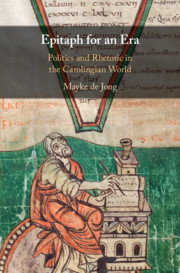Epitaph for an Era: Politics and Rhetoric in the Carolingian World by Mayke de Jong
Wala, abbot of Corbie, played a major role in the rebellions against Emperor Louis the Pious, especially in 830, for which he was exiled. Radbert defended his beloved abbot, known to his monks as Arsenius, against accusations of infidelity in an 'epitaph' (funeral oration), composed as a two-book conversation between himself and other monks of Corbie. Whereas the restrained first book of Radbert's Epitaphium Arsenii was written not long after Wala's death in 836, the polemical second book was added some twenty years later. This outspoken sequel covers the early 830s, yet it mostly addresses the political issues of the 850s, as well as Radbert's personal predicament. In Epitaph for an Era, an absorbing study of this fascinating text, Mayke de Jong examines the context of the Epitaphium's two books, the use of hindsight as a rhetorical strategy, and the articulation of notions of the public good in the mid-ninth century.
Kingship and Politics in the Late Ninth Century: Charles the Fat and the End of the Carolingian Empire by Simon MacLean
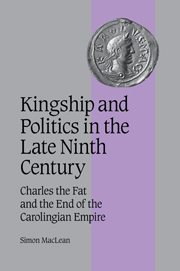 This is a major study of the collapse of the pan-European Carolingian empire and the reign of its last ruler, Charles III 'the Fat' (876–888). The later decades of the empire are conventionally seen as a dismal period of decline and fall, scarred by internal feuding, unfettered aristocratic ambition and Viking onslaught. This book offers an alternative interpretation, arguing that previous generations of historians misunderstood the nature and causes of the end of the empire, and neglected many of the relatively numerous sources for this period. Topics covered include the significance of aristocratic power; political structures; the possibilities and limits of kingship; developments in royal ideology; the struggle with the Vikings and the nature of regional political identities. In proposing these explanations for the empire's disintegration, the book has broader implications for our understanding of this formative period of European history more generally.
This is a major study of the collapse of the pan-European Carolingian empire and the reign of its last ruler, Charles III 'the Fat' (876–888). The later decades of the empire are conventionally seen as a dismal period of decline and fall, scarred by internal feuding, unfettered aristocratic ambition and Viking onslaught. This book offers an alternative interpretation, arguing that previous generations of historians misunderstood the nature and causes of the end of the empire, and neglected many of the relatively numerous sources for this period. Topics covered include the significance of aristocratic power; political structures; the possibilities and limits of kingship; developments in royal ideology; the struggle with the Vikings and the nature of regional political identities. In proposing these explanations for the empire's disintegration, the book has broader implications for our understanding of this formative period of European history more generally.
The French Renaissance Court by Robert J. Knecht
 The definitive account of the French court, 1483-1589. The court of France in the sixteenth century has often been seen merely as a focus of political intrigue and conflict, but it was also a cultural center in which the visual arts, music, literature, and sport flourished. This book traces for the first time in English the court’s evolution from a nomadic institution to a more sedentary one over the course of a century that began gloriously for France and ended in the horrors of civil war.
The definitive account of the French court, 1483-1589. The court of France in the sixteenth century has often been seen merely as a focus of political intrigue and conflict, but it was also a cultural center in which the visual arts, music, literature, and sport flourished. This book traces for the first time in English the court’s evolution from a nomadic institution to a more sedentary one over the course of a century that began gloriously for France and ended in the horrors of civil war.
Robert Knecht, a renowned expert on Renaissance France, explores the political and cultural importance of the French court through seven reigns from Charles VIII to Henry III, including the tumultuous regency of Catherine de' Medici. Against a sharp precis of political events, he details the structure, daily activities, and festivals of the court. Sumptuously illustrated throughout, this is an enthralling account of an opulent and dynamic institution in which image and representation were key.
Queens and Mistresses of Renaissance France by Kathleen Wellman
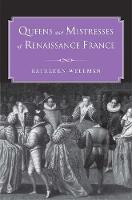 This book tells the history of the French Renaissance through the lives of its most prominent queens and mistresses, beginning with Agnès Sorel, the first officially recognized royal mistress in 1444; including Anne of Brittany, Catherine de Medici, Anne Pisseleu, Diane de Poitiers, and Marguerite de Valois, among others; and concluding with Gabrielle d’Estrées, Henry IV’s powerful mistress during the 1590s.
This book tells the history of the French Renaissance through the lives of its most prominent queens and mistresses, beginning with Agnès Sorel, the first officially recognized royal mistress in 1444; including Anne of Brittany, Catherine de Medici, Anne Pisseleu, Diane de Poitiers, and Marguerite de Valois, among others; and concluding with Gabrielle d’Estrées, Henry IV’s powerful mistress during the 1590s.
Wellman shows that women in both roles—queen and mistress—enjoyed great influence over French politics and culture, not to mention over the powerful men with whom they were involved. The book also addresses the enduring mythology surrounding these women, relating captivating tales that uncover much about Renaissance modes of argument, symbols, and values, as well as our own modern preoccupations.
Louis: The French Prince Who Invaded England by Catherine Hanley
 In 1215 a group of English barons, dissatisfied with the weak and despicable King John, decided that they needed a new monarch. They wanted a strong, experienced man, of royal blood, and they found him on the other side of the Channel: astonishingly, the most attractive candidate for the crown of England was Louis, eldest son and heir of the king of France.
In 1215 a group of English barons, dissatisfied with the weak and despicable King John, decided that they needed a new monarch. They wanted a strong, experienced man, of royal blood, and they found him on the other side of the Channel: astonishingly, the most attractive candidate for the crown of England was Louis, eldest son and heir of the king of France.
In this fascinating biography of England’s least-known “king”—and the first to be written in English—Catherine Hanley explores the life and times of “Louis the Lion” before, during, and beyond his quest for the English throne. She illuminates the national and international context of his 1216 invasion, and explains why and how after sixteen fruitless months he failed to make himself King Louis I of England. Hanley also explores Louis’s subsequent reign over France until his untimely death on the Albigensian Crusade. Published eight centuries after the creation of Magna Carta and on the 800th anniversary of Louis’s proclamation as king, this fascinating story is a colorful tale of national culture, power, and politics that brings a long-forgotten life out of the shadows of history.
Princely Power in Late Medieval France: Jeanne de Penthièvre and the War for Brittany by Erika Graham-Goering
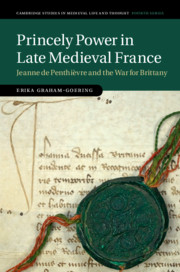 Jeanne de Penthièvre (c.1326–1384), duchess of Brittany, was an active and determined ruler who maintained her claim to the duchy throughout a war of succession and even after her eventual defeat. This in-depth study examines Jeanne's administrative and legal records to explore her co-rule with her husband, the social implications of ducal authority, and her strategies of legitimization in the face of conflict. While studies of medieval political authority often privilege royal, male, and exclusive models of power, Erika Graham-Goering reveals how there were multiple coexisting standards of princely action, and it was the navigation of these expectations that was more important to the successful exercise of power than adhering to any single approach. Cutting across categories of hierarchy, gender, and collaborative rule, this perspective sheds light on women's rulership as a crucial component in the power structures of the early Hundred Years' War, and demonstrates that lordship retained salience as a political category even in a period of growing monarchical authority.
Jeanne de Penthièvre (c.1326–1384), duchess of Brittany, was an active and determined ruler who maintained her claim to the duchy throughout a war of succession and even after her eventual defeat. This in-depth study examines Jeanne's administrative and legal records to explore her co-rule with her husband, the social implications of ducal authority, and her strategies of legitimization in the face of conflict. While studies of medieval political authority often privilege royal, male, and exclusive models of power, Erika Graham-Goering reveals how there were multiple coexisting standards of princely action, and it was the navigation of these expectations that was more important to the successful exercise of power than adhering to any single approach. Cutting across categories of hierarchy, gender, and collaborative rule, this perspective sheds light on women's rulership as a crucial component in the power structures of the early Hundred Years' War, and demonstrates that lordship retained salience as a political category even in a period of growing monarchical authority.
War and Government in the French Provinces by David Potter
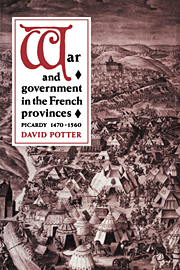 Few studies of the history of provincial France have hitherto spanned the conventional medieval/early-modern divide, and David Potter's detailed examination of war and government in Picardy, a region of France hitherto neglected by historians, has much to say about the development of French absolutism. Picardy emerged as a province after the campaigns of 1470–1477, and its experience of the first period of absolutism provides an enlightening contrast with that of other, more outlying provinces: the Picard nobility was notable for the extent of its participation in the army, the court and the government of France. David Potter provides a detailed analysis of the organisation of French military power in the province, and its impact during the period of the Habsburg-Valois wars. The work concludes with Picardy about to enter a difficult period of civil war.
Few studies of the history of provincial France have hitherto spanned the conventional medieval/early-modern divide, and David Potter's detailed examination of war and government in Picardy, a region of France hitherto neglected by historians, has much to say about the development of French absolutism. Picardy emerged as a province after the campaigns of 1470–1477, and its experience of the first period of absolutism provides an enlightening contrast with that of other, more outlying provinces: the Picard nobility was notable for the extent of its participation in the army, the court and the government of France. David Potter provides a detailed analysis of the organisation of French military power in the province, and its impact during the period of the Habsburg-Valois wars. The work concludes with Picardy about to enter a difficult period of civil war.
The Law of Treason and Treason Trials in Later Medieval France by S. H. Cuttler
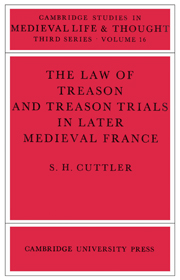 This book presents a balanced account not only of the theoretical framework and legal complexities of the law of treason in later medieval France, but also of the extent and political context of that law's enforcement. By shedding some light on a larger issue - the interplay of law and politics, authority and power - the book contributes to our understanding of the French monarchy's efforts in the crucial fourteenth and fifteenth centuries to protect, extend and enforce its authority. The crown needed virtually all its judicial resources to cope with treason. Summary judgement and judgement by notoriety had largely given way by the fifteenth century to institutionalized procedures; special mention is made of trial by commission and the trial of peers. In the last five chapters the prosecution of treason is treated narratively to illuminate the policies of individual kings. Throughout the book comparisons are made with the English law.
This book presents a balanced account not only of the theoretical framework and legal complexities of the law of treason in later medieval France, but also of the extent and political context of that law's enforcement. By shedding some light on a larger issue - the interplay of law and politics, authority and power - the book contributes to our understanding of the French monarchy's efforts in the crucial fourteenth and fifteenth centuries to protect, extend and enforce its authority. The crown needed virtually all its judicial resources to cope with treason. Summary judgement and judgement by notoriety had largely given way by the fifteenth century to institutionalized procedures; special mention is made of trial by commission and the trial of peers. In the last five chapters the prosecution of treason is treated narratively to illuminate the policies of individual kings. Throughout the book comparisons are made with the English law.